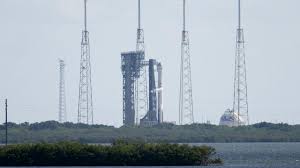Boeing Launch Scrubbed Starliner with Astronauts on Board
The first crewed launch of Boeing Starliner capsule was canceled on Saturday, August 3, 2023, posing a serious setback to NASA’s aspirations to expand its human spaceflight capabilities. With little under four minutes left on the countdown clock, a technical issue occurred when astronauts Barry “Butch” Wilmore and Sunita Williams were strapped in and prepared for liftoff from Florida’s Cape Canaveral Space Force Station.
The Starliner program has been beset by delays for years, and this most recent setback is just one more. Software glitches and other technical issues forced numerous postponements of the spacecraft’s 2017 astronaut launch schedule. After years of development and testing, this most recent effort at launch was meant to be a watershed moment.
A NASA statement identified a particular cause of the scrubbed launch as an issue with a ground support equipment system. The problem caused a computerized launch sequencer to malfunction and stop loading properly, which automatically ended the countdown. The nature of the issue with the ground support equipment is yet unknown, but it serves as a reminder of the complex web of interconnected systems that must work perfectly in order for a launch to be successful.
The astronauts’ safety was the main priority of the initial response. In a flash, technicians arrived at the launchpad to assist Wilmore and Williams in stepping out of the capsule onto the fully charged Atlas V rocket. Luckily, the abort procedure went without a hitch, and the crew left the spacecraft 1 hour after the launch scrub.
There is now a risk to the Starliner program’s immediate future. The mission was ultimately delayed to enable a more comprehensive assessment of the ground support equipment problem, even though NASA had originally expressed hope for a potential launch attempt the next day. For engineers to identify the precise source of the issue and put corrective measures in place, this extra time will be critical.
The consequences of this most recent setback go beyond the Starliner project. The International Space Station (ISS) has been the primary means of transportation for astronauts from the United States to Russia since the Space Shuttle’s retirement in 2011. This reliance on Russia has grown to be a geopolitical issue, especially in view of the continuing conflict in Ukraine. Strengthening American space independence, a successful Starliner program would give NASA a domestic astronaut transportation option.
The difficulties Boeing faced with Starliner also had an impact on the company’s standing in the aerospace sector. Schedule delays and cost overruns have been criticized as persistent problems with the program. The difficulties Boeing has in fulfilling NASA’s exacting safety and performance requirements are further highlighted by this most recent launch abort.
In the near future, NASA and Boeing will concentrate on overcoming the technological obstacles that have impeded Starliner’s advancement. The key goals of the program are still a successful launch and docking with the ISS. In addition to confirming the Starliner capsule’s capabilities, this mission would open the door for crewed trips to the International Space Station and other destinations.
But the current failure is a harsh reminder of the risks and complexity that come with space travel. Even while there are enormous potential benefits, there are frequently unexpected delays and technical difficulties along the way. How soon Boeing can get over these most recent obstacles and bring Starliner back on track for a successful launch will be determined in the coming weeks.
